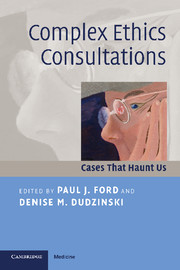Book contents
- Frontmatter
- Contents
- List of contributors
- Foreword
- Acknowledgments
- Introduction: Live and learn: courage, honesty, and vulnerability
- Part I Starting at the beginning: prenatal and neonatal issues
- Part II The most vulnerable of us: pediatrics
- Part III Diversity of desires and limits of liberty: psychiatric and psychological issues
- Part IV Withholding therapy with a twist
- Part V The unspeakable/unassailable: religious and cultural beliefs
- Part VI Human guinea pigs and miracles: clinical innovations and unorthodox treatment
- Part VII The big picture: organizational issues
- 25 It's not my responsibility
- 26 Intra-operative exposure to sporadic Creutzfeldt-Jakob disease: to disclose or not to disclose
- 27 Why do we have to discharge this patient?
- 28 Who's that sleeping in my bed? An institutional response to an organizational ethics problem
- Conclusions, educational activities, and references
- Index
26 - Intra-operative exposure to sporadic Creutzfeldt-Jakob disease: to disclose or not to disclose
Published online by Cambridge University Press: 03 May 2010
- Frontmatter
- Contents
- List of contributors
- Foreword
- Acknowledgments
- Introduction: Live and learn: courage, honesty, and vulnerability
- Part I Starting at the beginning: prenatal and neonatal issues
- Part II The most vulnerable of us: pediatrics
- Part III Diversity of desires and limits of liberty: psychiatric and psychological issues
- Part IV Withholding therapy with a twist
- Part V The unspeakable/unassailable: religious and cultural beliefs
- Part VI Human guinea pigs and miracles: clinical innovations and unorthodox treatment
- Part VII The big picture: organizational issues
- 25 It's not my responsibility
- 26 Intra-operative exposure to sporadic Creutzfeldt-Jakob disease: to disclose or not to disclose
- 27 Why do we have to discharge this patient?
- 28 Who's that sleeping in my bed? An institutional response to an organizational ethics problem
- Conclusions, educational activities, and references
- Index
Summary
Case narrative
As senior ethics consultant on-call for the month, I received a telephone call from a hospital administrator requesting the opinion of the ethics committee prior to the department of health visiting the following day. The dilemma was whether a patient who may have been exposed to sporadic Creutzfeldt-Jakob disease (CJD) by surgical instruments during a brain operation should be informed of the exposure in view of the remote chance of the patient contracting CJD and the likely immediate and continuing emotional distress to the patient.
The patient, no longer in the hospital, had brain surgery 11 days before. The instruments used for the patient's operation were in one of six sets used on the day of the patient's operation. One of these sets had been used the previous day for a brain operation. The pathology report for that operation, which listed unsuspected CJD, did not arrive until all neurosurgical operations on the day of the patient's surgery had been completed. All operative instruments had undergone routine cleaning and sterilization, which may have been inadequate to kill the prions responsible for CJD. In fact, in the case of CJD the Centers for Disease Control and Prevention (CDC) recommends cleaning and sterilization techniques that are not generally used because they may be harmful to the surgical instruments or, alternatively, disposal of such instruments.
It is unusual to receive a request from hospital administration regarding a clinical case, especially regarding a patient already discharged and with the urgency occasioned by a department of health review.
- Type
- Chapter
- Information
- Complex Ethics ConsultationsCases that Haunt Us, pp. 205 - 211Publisher: Cambridge University PressPrint publication year: 2008



